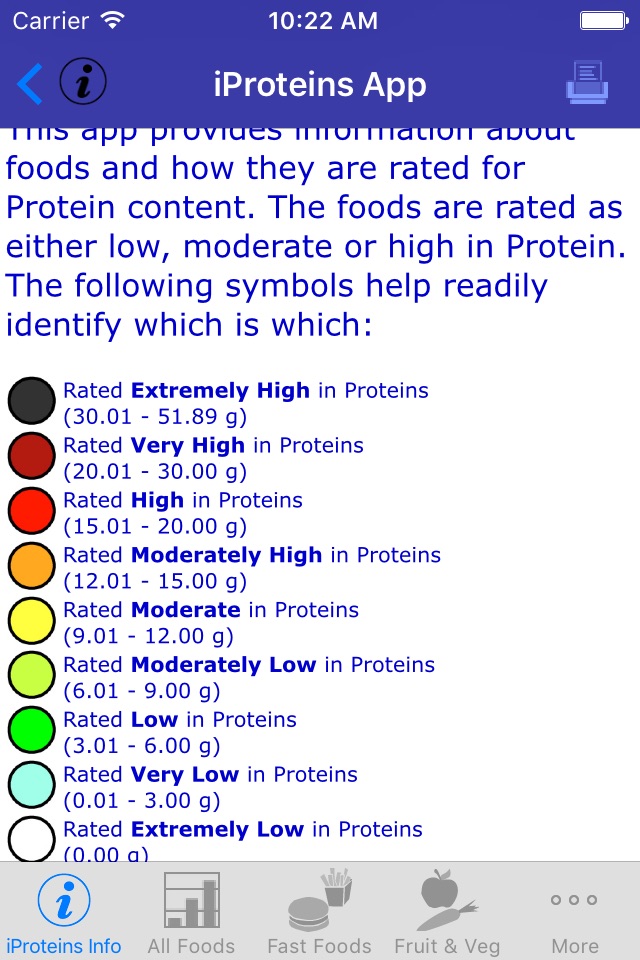
iProteins is one of 10 iNutrient apps based on the USDA National Nutrient Database. The others include:
- iCarbs (Carbohydrates)
- iCholesterol (Dietary Cholesterol)
- iFiber (Fiber)
- iKals (Calories)
- iPotassium (Potassium)
- iSatFat (Saturated Fat)
- iSodium (Sodium)
- iSugars (Sugars)
- Vitamin K (Vitamins K1, K1D & K2)
Users can record their intake for any food. The information is maintained for one year and is presented in reverse chronological order grouped by day, so the latest data is presented first in the list. Editing allows for: 1) changing the number of servings; 2) changing the date; and 3) deleting records. Individual Intake Items can be copied to the current day, and all Intake Items for a single day can be copied to the current day.
Review by Teresa Abbate of This Dish is Vegetarian (www.thisdishisvegetarian.com):
---
You can find an app for anything- shopping, dining out, even finding public restrooms in your city. But for vegetarians and vegans who want to make sure theyre getting enough protein in their diet, start downloading iProteins.
Designed for bodybuilders and vegans concerned with their protein intake, iProtein users can look up different foods according to category- groupings include Fruits & Vegetables, Fast Food, Dairy & Eggs, Cereal Grains, and Snacks. For each food selection, the app will list the serving size, calorie content, protein content in grams, percentage of protein by weight, and the USDA Nutrient Database number.
The information is derived from the USDA National Nutrient Database for Standard Reference: Protein Content of Selected Foods per Common Measure. iProtein currently features over 1,100 different food servings and can also be searched according to how a food is prepared. (i.e. "canned spinach" versus "frozen spinach" or "granola with raisins") ...
iProteins will also provide information pages on obtaining proteins on a vegan diet and the foods with the highest content. ...
Though most knowledgeable vegans and vegetarians have already done their nutrition homework and know how to get their daily protein intake, this will still be a helpful app when in the grocery store or when dining out. Its also a great tool for new vegetarians and vegans, and for anyone whos ever asked them, "So where do you get your protein from?"
---
The iProteins app provides information about foods and how they are rated for protein content. This is provided as a means to assist in deciding which foods to eat. If you are a bodybuilder, you probably want to have a high intake of carbohydrates, but on the other hand if you are a vegan then you want to make sure you are taking in a sufficient amount of protein. The food servings are rated from EXTREMELY LOW in Proteins all the way up to EXTREMELY HIGH. The following colors help readily identify which is which:
- Black = Rated EXTREMELY HIGH in Proteins (30.01 - 51.89 g)
- Dark Red = Rated VERY HIGH in Proteins (20.01 - 30.00 g)
- Red = Rated HIGH in Proteins (15.01 - 20.00 g)
- Orange = Rated MODERATELY HIGH in Proteins (12.01 - 15.00 g)
- Yellow = Rated MODERATE in Proteins (9.01 - 12.00 g)
- Yellow-Green = Rated MODERATELY LOW in Proteins (6.01 - 9.00 g)
- Green = Rated LOW in Proteins (3.01 - 6.00 g)
- Cyan = Rated VERY LOW in Proteins (0.01 - 3.00 g)
- White = Rated EXTREMELY LOW in Proteins (0.00 g)
There are eight tables listing food servings:
- All Foods
- Fast Foods
- Fruits & Vegetables
- Meat, Fish & Shellfish
- Dairy & Egg
- Cereal Grains & Pasta
- Sweets
- Snacks
The All Foods list allows you to search by any word or partial word from all the Food Titles.
Selecting a food in any of the tables will display pertinent information about the selected food serving:
- Food Title
- Weight (in grams)
- Common Measure (serving size for weight)
- Protein Content (in grams)
- Calories
- Percentage of Protein by Weight (if at least 1%)
- USDA Description
- USDA Food Group
- USDA Nutrient Database Number



